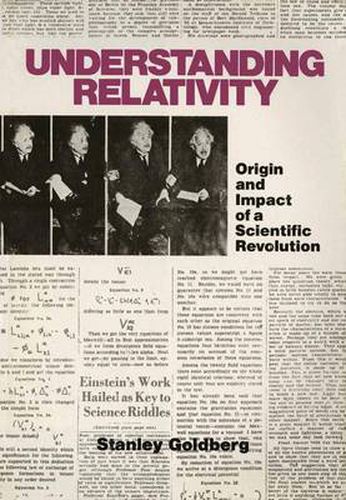Readings Newsletter
Become a Readings Member to make your shopping experience even easier.
Sign in or sign up for free!
You’re not far away from qualifying for FREE standard shipping within Australia
You’ve qualified for FREE standard shipping within Australia
The cart is loading…






This title is printed to order. This book may have been self-published. If so, we cannot guarantee the quality of the content. In the main most books will have gone through the editing process however some may not. We therefore suggest that you be aware of this before ordering this book. If in doubt check either the author or publisher’s details as we are unable to accept any returns unless they are faulty. Please contact us if you have any questions.
The central subject matter of this book is Einstein’s special theory of relativiry. While it is a book that is written primarily for a lay audience this does not necessarily mean an audience not versed in the ways of doing science. Rather, this book is written for anyone wishing to consider the nature of the scientific enterprise: where ideas come from, how they become established and accepted, what the relationships are among theories, predictions, and measurements, or the relationship between ideas in a scientific theory and the values held to be important within the larger culture. Some readers will find it strange that I raise any of these issues. It is a common view in our culture that the status of knowledge within science is totally different from the status of knowledge in other areas of human endeavor. The word science stems from the Latin word meaning to know and indeed, knowledge which scientists acquire in their work is commonly held to be certain, unyielding, and absolute. Consider how we use the adjective scientific.
There are investors and there are scientific investors. There are socialists and there are scientific socialists. There are exterminators and there are scientific exterminators. We all know how the modifier scientific inttudes in our daily life. It is the purpose of this book to challenge the belief that scientific knowledge is different from other kinds of knowledge.
$9.00 standard shipping within Australia
FREE standard shipping within Australia for orders over $100.00
Express & International shipping calculated at checkout
This title is printed to order. This book may have been self-published. If so, we cannot guarantee the quality of the content. In the main most books will have gone through the editing process however some may not. We therefore suggest that you be aware of this before ordering this book. If in doubt check either the author or publisher’s details as we are unable to accept any returns unless they are faulty. Please contact us if you have any questions.
The central subject matter of this book is Einstein’s special theory of relativiry. While it is a book that is written primarily for a lay audience this does not necessarily mean an audience not versed in the ways of doing science. Rather, this book is written for anyone wishing to consider the nature of the scientific enterprise: where ideas come from, how they become established and accepted, what the relationships are among theories, predictions, and measurements, or the relationship between ideas in a scientific theory and the values held to be important within the larger culture. Some readers will find it strange that I raise any of these issues. It is a common view in our culture that the status of knowledge within science is totally different from the status of knowledge in other areas of human endeavor. The word science stems from the Latin word meaning to know and indeed, knowledge which scientists acquire in their work is commonly held to be certain, unyielding, and absolute. Consider how we use the adjective scientific.
There are investors and there are scientific investors. There are socialists and there are scientific socialists. There are exterminators and there are scientific exterminators. We all know how the modifier scientific inttudes in our daily life. It is the purpose of this book to challenge the belief that scientific knowledge is different from other kinds of knowledge.